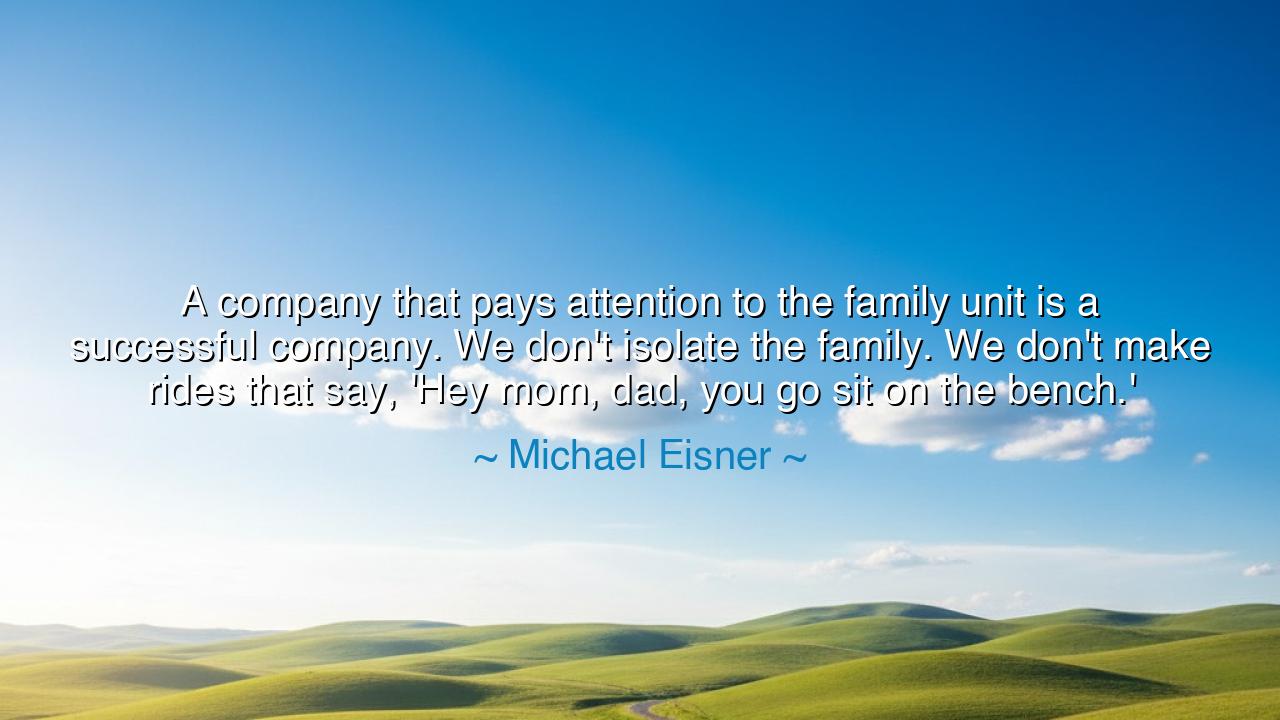
A company that pays attention to the family unit is a successful
A company that pays attention to the family unit is a successful company. We don't isolate the family. We don't make rides that say, 'Hey mom, dad, you go sit on the bench.'






Listen, O children of enterprise and dreamers of creation, to the words of Michael Eisner, who once guided the great kingdom of Disney through an age of wonder and imagination. He said: “A company that pays attention to the family unit is a successful company. We don't isolate the family. We don't make rides that say, 'Hey mom, dad, you go sit on the bench.'” In these words lies not only a philosophy of business, but a vision of human harmony, for Eisner speaks not merely of commerce, but of connection—the sacred unity of generations sharing joy together.
From ancient times, the wisest rulers knew that the strength of a nation lay not in its armies or wealth, but in the bond of its families. The home is the first kingdom each soul ever knows; it is the seedbed of virtue, courage, and imagination. When a leader, whether of a nation or a company, honors the family, he honors the roots of civilization itself. Eisner’s insight reflects this timeless truth: that the most powerful experiences are those that bring people together, allowing them to see each other again with wonder.
In the days of Walt Disney himself, this truth was woven into the very soil of his dream. When he created Disneyland, it was not to be a playground for children alone, nor a retreat for adults seeking escape. It was to be a realm of shared enchantment, where parents and children could walk side by side through the kingdoms of fantasy and memory. Walt once said, “You can design and create the most wonderful place in the world, but it takes people to make the dream a reality.” Eisner, inheriting this torch, understood that those people were not just employees or customers—they were families, bound by affection, seeking moments of joy that could not be purchased, only experienced together.
Consider how even the great empires of old fell when they neglected this simple truth. When Rome became more concerned with spectacle than with virtue, when the hearth lost its warmth and children no longer looked to their elders with awe, the spirit of unity faded. Likewise, a company that chases profit without soul, that isolates rather than connects, may grow in numbers but not in meaning. Eisner’s words are a warning and a blessing: that success without shared joy is hollow, but joy shared among family becomes eternal.
The theater of business, much like the theater of life, thrives on empathy. When a company creates experiences that embrace all ages, it becomes a bridge between generations. The laughter of a child and the smile of a parent resonate as one—a symphony of belonging. This is not mere marketing; it is the art of honoring human wholeness. Eisner’s philosophy teaches that the true measure of success is not counted in coins, but in the moments of togetherness that endure long after the gates close or the lights dim.
And so, the wisdom of this quote calls out to every creator, builder, and leader: Do not forget the family unit, for it is both the origin and the destiny of all human endeavor. When you design, build, or serve, ask not, “What will sell?” but rather, “What will unite?” Ask how your work might draw the child closer to the parent, how it might give them reason to look upon each other with shared delight. In doing so, you will not only craft products—you will craft memories, and memory is the currency of the heart.
The lesson is clear and radiant as dawn: connection is the truest form of success. Let your work—be it a company, a song, or a garden—be a place where generations meet, where laughter crosses years, and where no one sits forgotten on the bench. Create as one who serves the human family itself. For in honoring togetherness, you do what the greatest builders, philosophers, and dreamers of all ages have done: you participate in the eternal work of uniting hearts.
Thus spoke Eisner—not as a merchant, but as a sage of joy. His wisdom endures beyond his age, reminding us that to build for families is to build for eternity. And when a company, or a soul, remembers that, it becomes more than successful—it becomes beloved.






AAdministratorAdministrator
Welcome, honored guests. Please leave a comment, we will respond soon